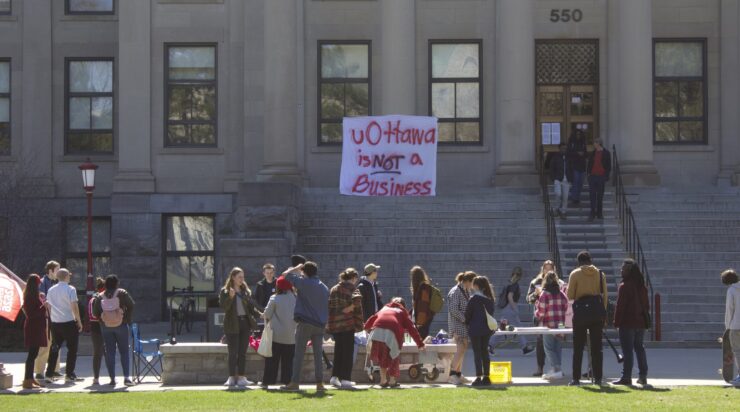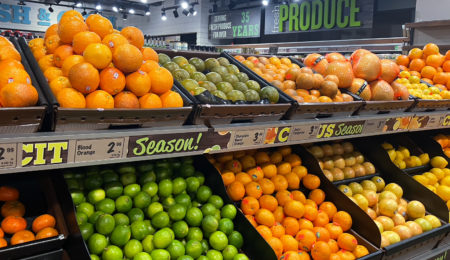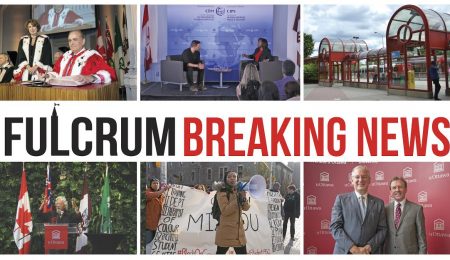Roughly one hundred people, including students leaders and union members, came together for Thursday’s rally
CUPE 2626, the union representing teaching assistants, tutors, residence life workers, and other employees at the University of Ottawa, held a rally on Tabaret Lawn to take action during a Board of Governors meeting.
In a press release delivered Thursday morning, CUPE 2626 stated they were “sounding the alarm as budget cuts damage educational quality and cut programs, in moves that prioritize revenue over learning experience.”
Catherine Larocque, CUPE 2626 president and Ph.D. nursing student, argues that the University has displayed poor financial management and a lack of transparency, which led to academic service drawbacks. She referenced large cuts to teaching assistant contracts, the closure of the School of Translation, and the closure of discussion groups and seminars for Francophone programs.
“Another big issue is the slashing of our graduate funding. So compared to last year, all of the graduate funding has been slashed by at least 50 per cent across different departments,” said Larocque in an interview with the Fulcrum. “We have members that are living in absolute poverty. We get emails from members who have nowhere to live, nothing to eat, and they can’t secure any employment.”
Emily Kotow, the liaison officer for CUPE 2626 and a Ph.D. philosophy student, said that they hosted the rally to remind the University that teaching assistants are not an afterthought, and that students and professors make up the university community.
“They’re not hiring new professors … we’re not being offered more TA-ships to be able to support these students,” she said. “So what we’re looking at is putting more students into larger classes with poorly paid assistant professors, fewer TAs, higher tuition, fees, and overall proceeding lower quality of education.”
Larocque, who has been a teaching assistant nearly ten times, said that the fall 2022 semester was the first time she was not offered a full contract.
“Every other time I received 130 hours. This year, all of a sudden, I’m only receiving 65 hours, but I’m expected to complete the exact same amount of work. So, I’m still expected to mark papers and show up to class but with half the amount of hours,” she said.
Armaan Singh, the president of the University of Ottawa Students’ Union (UOSU), said the Union stands in solidarity with CUPE 2626.
“The University’s decisions are not student-centric or worker-centric at all. So I think it’s incumbent on the University to prioritize the workers and students who really make the University the place it is, and not cut our budgets [or] increase our tuition,” said Singh.
Kotow said that CUPE 2626 has been experiencing an “incredibly challenging” round of bargaining with the University. “That is in large part because of the University’s unwillingness to allow us to make any sort of progress and gains and they, again, expect us to be grateful for this reduction,” she said.
“I would like to be able to have an open conversation with this university, but how we actually raise the quality of this university, which means investing in its labour, and that is not on the table at this point.”
Jesse Robichaud, a spokesperson for the University administration, said in a statement to the Fulcrum, “While responsible measures have been taken in administrative budgets to ensure we can continue to invest robustly in study programs and research, CUPE 2626 is making claims that are out of touch with the plain operational reality across our campuses.”
“The University of Ottawa openly shares its financial and budget information transparently on its website and in other interactive forums. However, after observing the unfounded claims made in literature distributed by CUPE 2626, the University recognizes there are gaps and it will endeavour to increase its efforts to ensure the University community gains a stronger understanding of the University’s budget and financial viability,” said Robichaud.
Editor’s Note: This article was edited on May 12, 2022





